Nursing Assignment: Indigenous Health in Brisbane, Australia
VerifiedAdded on 2020/10/22
|5
|1124
|456
Report
AI Summary
This report provides an overview of Indigenous health in Brisbane, Australia, addressing key aspects such as the definition of health from an Indigenous perspective, the identification of traditional custodians, and the impact of racism and discrimination on health outcomes. It also includes a reflection on the author's own cultural identity and its influence on health beliefs, highlighting the challenges faced by Indigenous Australians in accessing healthcare and maintaining overall well-being. The report emphasizes the importance of understanding the social, cultural, and emotional factors that contribute to the health of Indigenous communities, along with the detrimental effects of discrimination. The references section includes books, journals, and online resources used in the research.
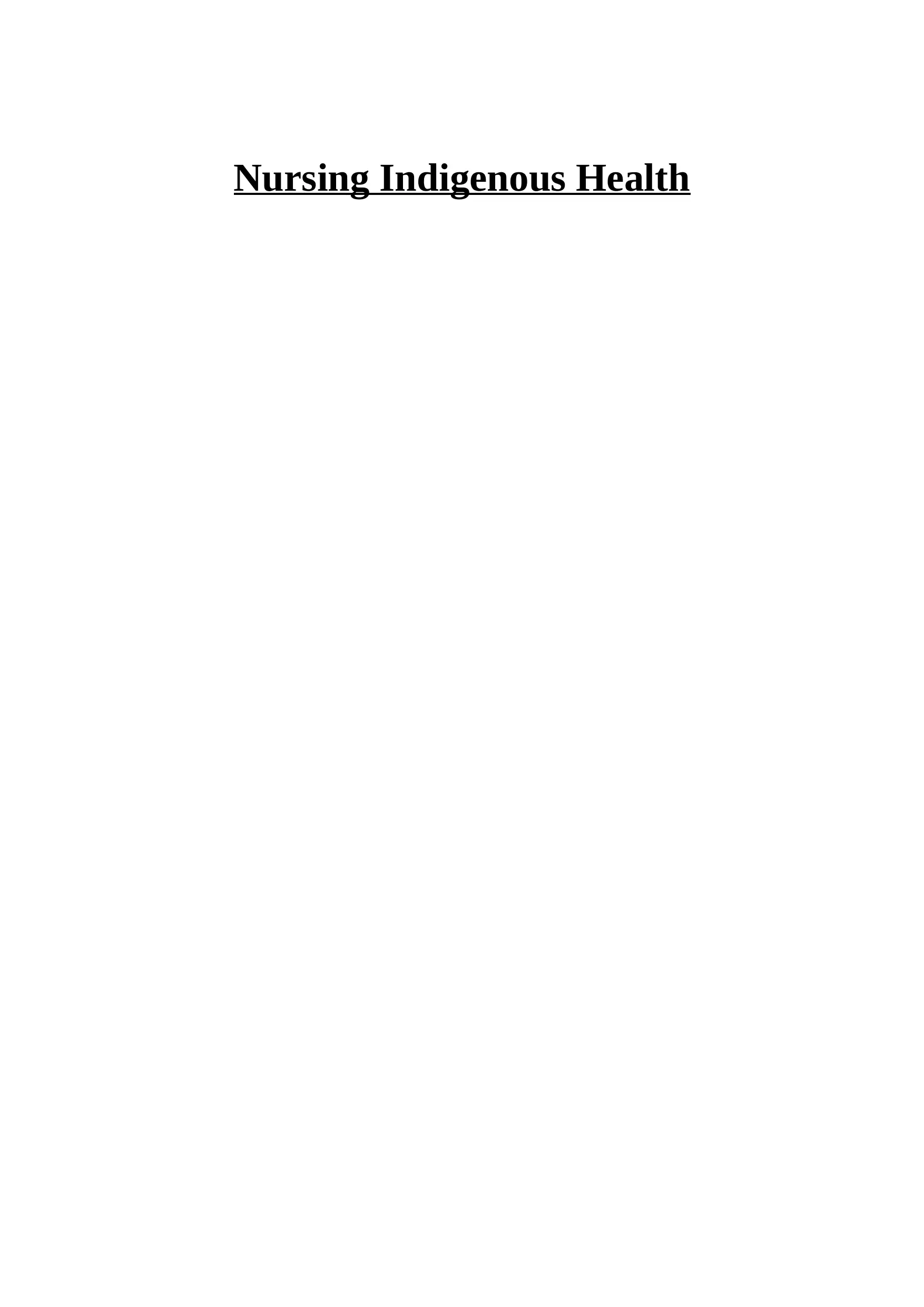
Nursing Indigenous Health
Paraphrase This Document
Need a fresh take? Get an instant paraphrase of this document with our AI Paraphraser
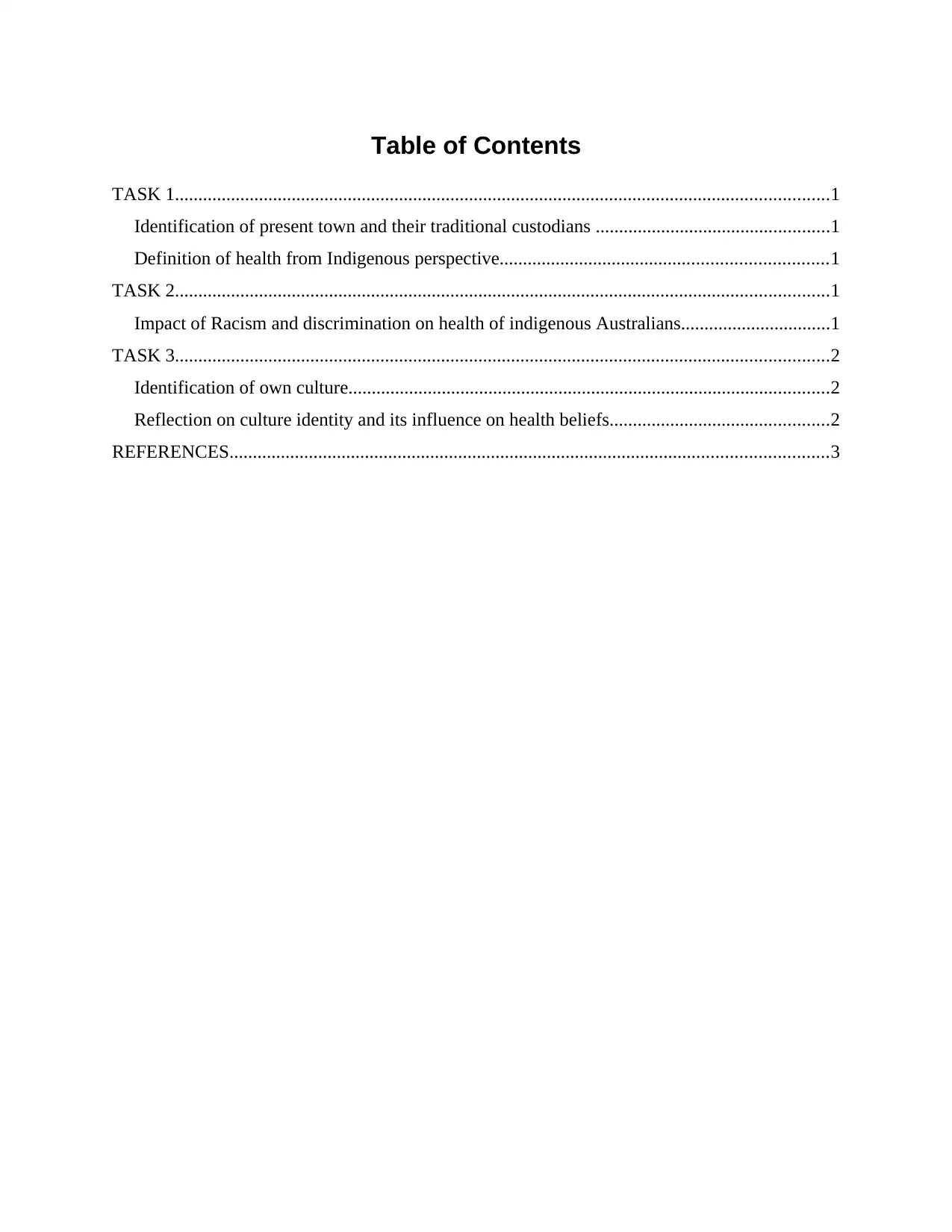
Table of Contents
TASK 1............................................................................................................................................1
Identification of present town and their traditional custodians ..................................................1
Definition of health from Indigenous perspective......................................................................1
TASK 2............................................................................................................................................1
Impact of Racism and discrimination on health of indigenous Australians................................1
TASK 3............................................................................................................................................2
Identification of own culture.......................................................................................................2
Reflection on culture identity and its influence on health beliefs...............................................2
REFERENCES................................................................................................................................3
TASK 1............................................................................................................................................1
Identification of present town and their traditional custodians ..................................................1
Definition of health from Indigenous perspective......................................................................1
TASK 2............................................................................................................................................1
Impact of Racism and discrimination on health of indigenous Australians................................1
TASK 3............................................................................................................................................2
Identification of own culture.......................................................................................................2
Reflection on culture identity and its influence on health beliefs...............................................2
REFERENCES................................................................................................................................3
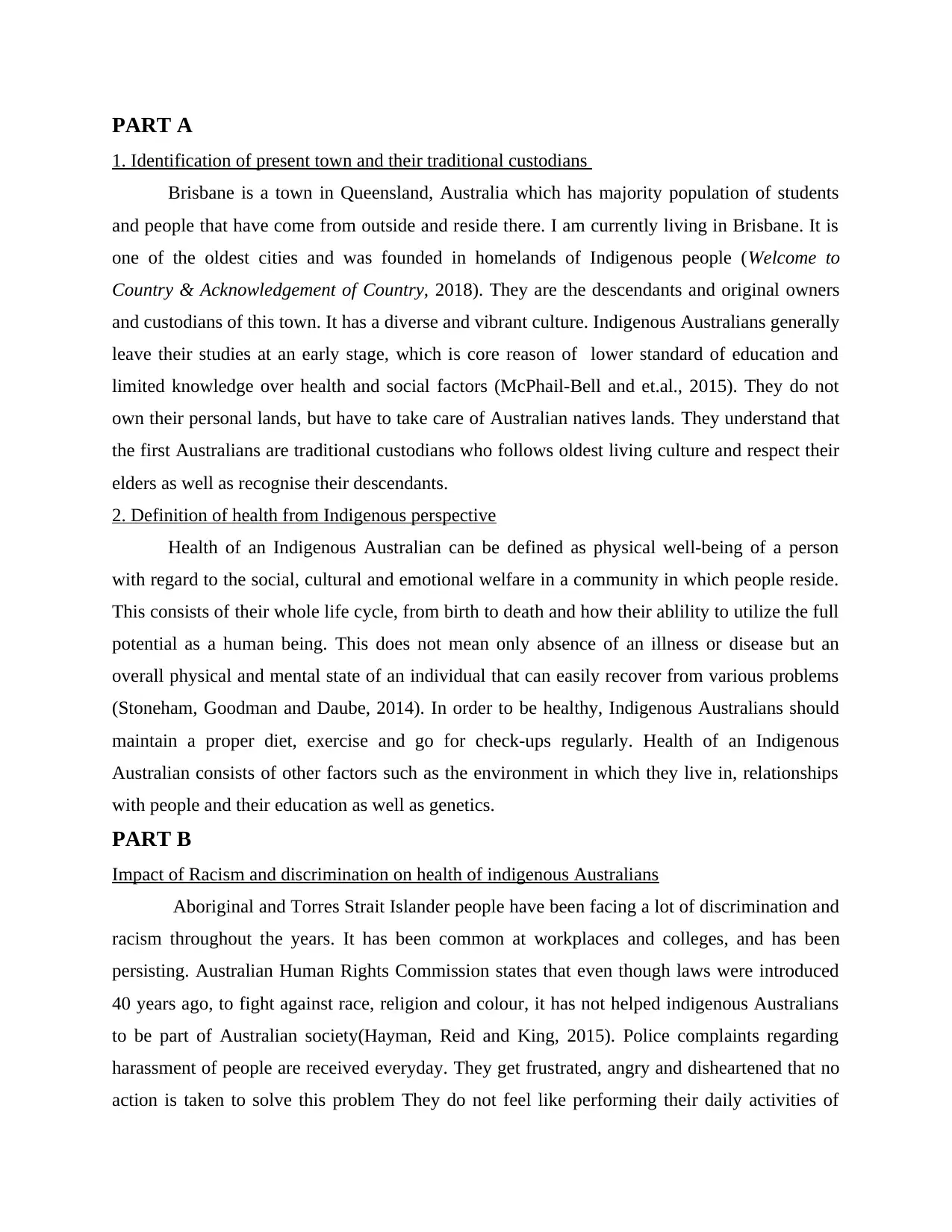
PART A
1. Identification of present town and their traditional custodians
Brisbane is a town in Queensland, Australia which has majority population of students
and people that have come from outside and reside there. I am currently living in Brisbane. It is
one of the oldest cities and was founded in homelands of Indigenous people (Welcome to
Country & Acknowledgement of Country, 2018). They are the descendants and original owners
and custodians of this town. It has a diverse and vibrant culture. Indigenous Australians generally
leave their studies at an early stage, which is core reason of lower standard of education and
limited knowledge over health and social factors (McPhail‐Bell and et.al., 2015). They do not
own their personal lands, but have to take care of Australian natives lands. They understand that
the first Australians are traditional custodians who follows oldest living culture and respect their
elders as well as recognise their descendants.
2. Definition of health from Indigenous perspective
Health of an Indigenous Australian can be defined as physical well-being of a person
with regard to the social, cultural and emotional welfare in a community in which people reside.
This consists of their whole life cycle, from birth to death and how their ablility to utilize the full
potential as a human being. This does not mean only absence of an illness or disease but an
overall physical and mental state of an individual that can easily recover from various problems
(Stoneham, Goodman and Daube, 2014). In order to be healthy, Indigenous Australians should
maintain a proper diet, exercise and go for check-ups regularly. Health of an Indigenous
Australian consists of other factors such as the environment in which they live in, relationships
with people and their education as well as genetics.
PART B
Impact of Racism and discrimination on health of indigenous Australians
Aboriginal and Torres Strait Islander people have been facing a lot of discrimination and
racism throughout the years. It has been common at workplaces and colleges, and has been
persisting. Australian Human Rights Commission states that even though laws were introduced
40 years ago, to fight against race, religion and colour, it has not helped indigenous Australians
to be part of Australian society(Hayman, Reid and King, 2015). Police complaints regarding
harassment of people are received everyday. They get frustrated, angry and disheartened that no
action is taken to solve this problem They do not feel like performing their daily activities of
1. Identification of present town and their traditional custodians
Brisbane is a town in Queensland, Australia which has majority population of students
and people that have come from outside and reside there. I am currently living in Brisbane. It is
one of the oldest cities and was founded in homelands of Indigenous people (Welcome to
Country & Acknowledgement of Country, 2018). They are the descendants and original owners
and custodians of this town. It has a diverse and vibrant culture. Indigenous Australians generally
leave their studies at an early stage, which is core reason of lower standard of education and
limited knowledge over health and social factors (McPhail‐Bell and et.al., 2015). They do not
own their personal lands, but have to take care of Australian natives lands. They understand that
the first Australians are traditional custodians who follows oldest living culture and respect their
elders as well as recognise their descendants.
2. Definition of health from Indigenous perspective
Health of an Indigenous Australian can be defined as physical well-being of a person
with regard to the social, cultural and emotional welfare in a community in which people reside.
This consists of their whole life cycle, from birth to death and how their ablility to utilize the full
potential as a human being. This does not mean only absence of an illness or disease but an
overall physical and mental state of an individual that can easily recover from various problems
(Stoneham, Goodman and Daube, 2014). In order to be healthy, Indigenous Australians should
maintain a proper diet, exercise and go for check-ups regularly. Health of an Indigenous
Australian consists of other factors such as the environment in which they live in, relationships
with people and their education as well as genetics.
PART B
Impact of Racism and discrimination on health of indigenous Australians
Aboriginal and Torres Strait Islander people have been facing a lot of discrimination and
racism throughout the years. It has been common at workplaces and colleges, and has been
persisting. Australian Human Rights Commission states that even though laws were introduced
40 years ago, to fight against race, religion and colour, it has not helped indigenous Australians
to be part of Australian society(Hayman, Reid and King, 2015). Police complaints regarding
harassment of people are received everyday. They get frustrated, angry and disheartened that no
action is taken to solve this problem They do not feel like performing their daily activities of
⊘ This is a preview!⊘
Do you want full access?
Subscribe today to unlock all pages.

Trusted by 1+ million students worldwide
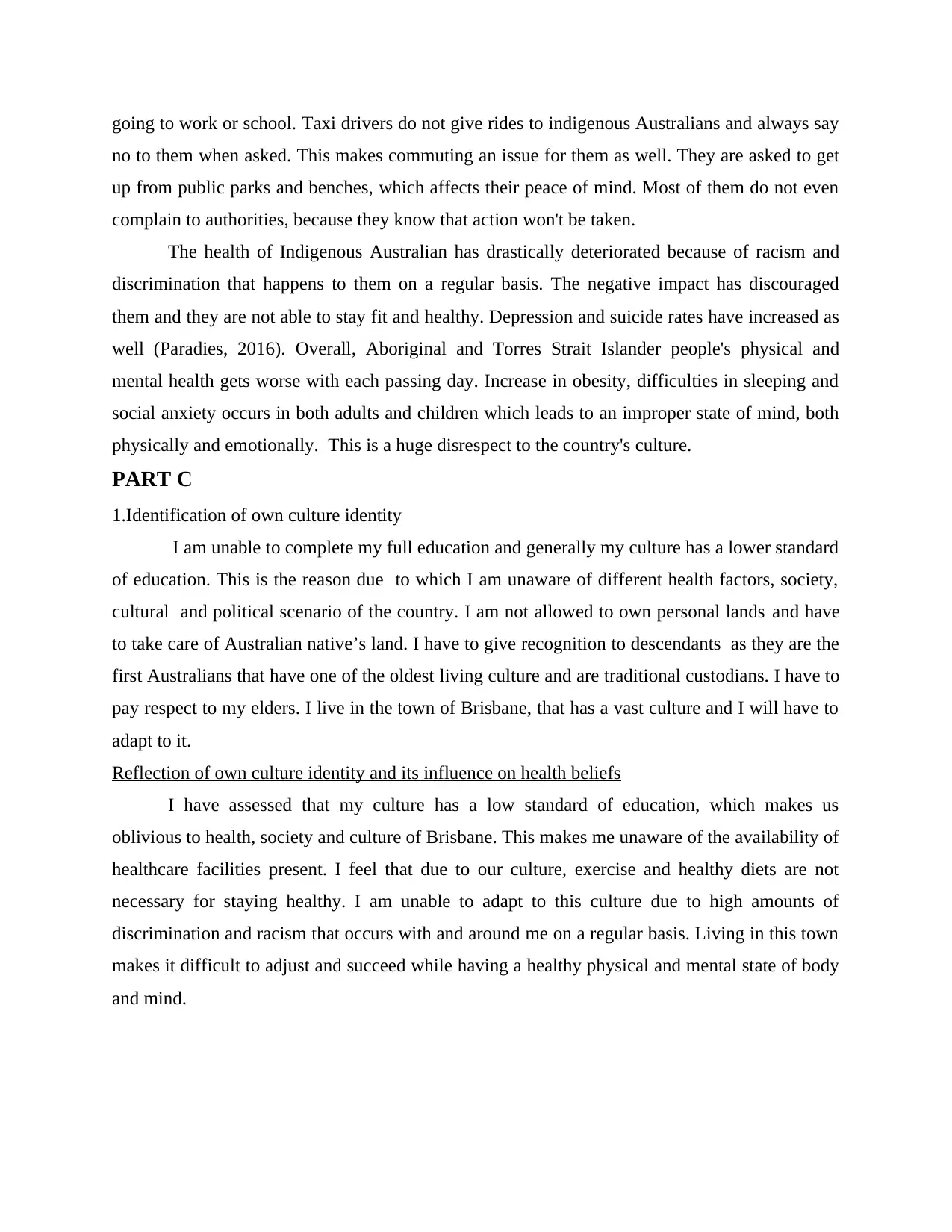
going to work or school. Taxi drivers do not give rides to indigenous Australians and always say
no to them when asked. This makes commuting an issue for them as well. They are asked to get
up from public parks and benches, which affects their peace of mind. Most of them do not even
complain to authorities, because they know that action won't be taken.
The health of Indigenous Australian has drastically deteriorated because of racism and
discrimination that happens to them on a regular basis. The negative impact has discouraged
them and they are not able to stay fit and healthy. Depression and suicide rates have increased as
well (Paradies, 2016). Overall, Aboriginal and Torres Strait Islander people's physical and
mental health gets worse with each passing day. Increase in obesity, difficulties in sleeping and
social anxiety occurs in both adults and children which leads to an improper state of mind, both
physically and emotionally. This is a huge disrespect to the country's culture.
PART C
1.Identification of own culture identity
I am unable to complete my full education and generally my culture has a lower standard
of education. This is the reason due to which I am unaware of different health factors, society,
cultural and political scenario of the country. I am not allowed to own personal lands and have
to take care of Australian native’s land. I have to give recognition to descendants as they are the
first Australians that have one of the oldest living culture and are traditional custodians. I have to
pay respect to my elders. I live in the town of Brisbane, that has a vast culture and I will have to
adapt to it.
Reflection of own culture identity and its influence on health beliefs
I have assessed that my culture has a low standard of education, which makes us
oblivious to health, society and culture of Brisbane. This makes me unaware of the availability of
healthcare facilities present. I feel that due to our culture, exercise and healthy diets are not
necessary for staying healthy. I am unable to adapt to this culture due to high amounts of
discrimination and racism that occurs with and around me on a regular basis. Living in this town
makes it difficult to adjust and succeed while having a healthy physical and mental state of body
and mind.
no to them when asked. This makes commuting an issue for them as well. They are asked to get
up from public parks and benches, which affects their peace of mind. Most of them do not even
complain to authorities, because they know that action won't be taken.
The health of Indigenous Australian has drastically deteriorated because of racism and
discrimination that happens to them on a regular basis. The negative impact has discouraged
them and they are not able to stay fit and healthy. Depression and suicide rates have increased as
well (Paradies, 2016). Overall, Aboriginal and Torres Strait Islander people's physical and
mental health gets worse with each passing day. Increase in obesity, difficulties in sleeping and
social anxiety occurs in both adults and children which leads to an improper state of mind, both
physically and emotionally. This is a huge disrespect to the country's culture.
PART C
1.Identification of own culture identity
I am unable to complete my full education and generally my culture has a lower standard
of education. This is the reason due to which I am unaware of different health factors, society,
cultural and political scenario of the country. I am not allowed to own personal lands and have
to take care of Australian native’s land. I have to give recognition to descendants as they are the
first Australians that have one of the oldest living culture and are traditional custodians. I have to
pay respect to my elders. I live in the town of Brisbane, that has a vast culture and I will have to
adapt to it.
Reflection of own culture identity and its influence on health beliefs
I have assessed that my culture has a low standard of education, which makes us
oblivious to health, society and culture of Brisbane. This makes me unaware of the availability of
healthcare facilities present. I feel that due to our culture, exercise and healthy diets are not
necessary for staying healthy. I am unable to adapt to this culture due to high amounts of
discrimination and racism that occurs with and around me on a regular basis. Living in this town
makes it difficult to adjust and succeed while having a healthy physical and mental state of body
and mind.
Paraphrase This Document
Need a fresh take? Get an instant paraphrase of this document with our AI Paraphraser
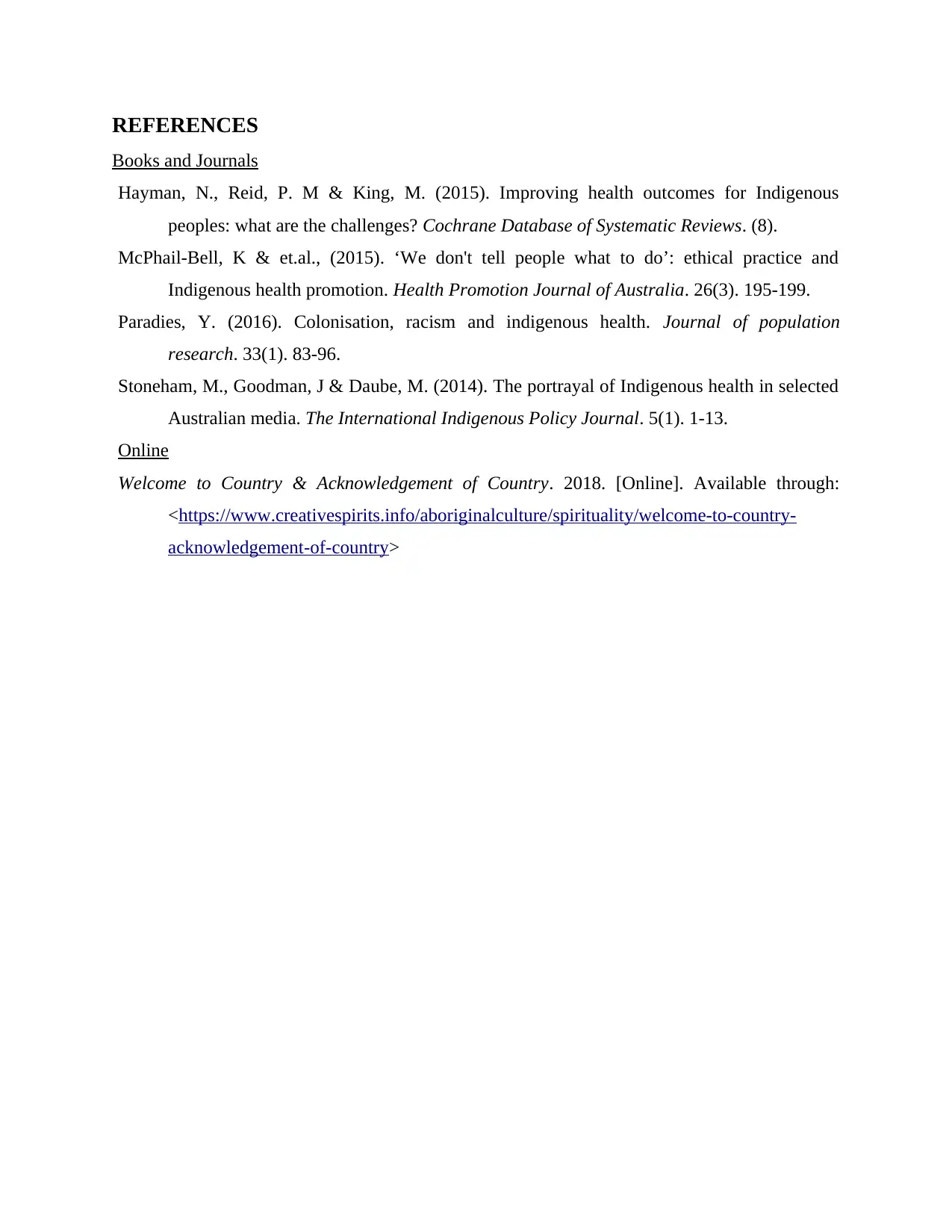
REFERENCES
Books and Journals
Hayman, N., Reid, P. M & King, M. (2015). Improving health outcomes for Indigenous
peoples: what are the challenges? Cochrane Database of Systematic Reviews. (8).
McPhail‐Bell, K & et.al., (2015). ‘We don't tell people what to do’: ethical practice and
Indigenous health promotion. Health Promotion Journal of Australia. 26(3). 195-199.
Paradies, Y. (2016). Colonisation, racism and indigenous health. Journal of population
research. 33(1). 83-96.
Stoneham, M., Goodman, J & Daube, M. (2014). The portrayal of Indigenous health in selected
Australian media. The International Indigenous Policy Journal. 5(1). 1-13.
Online
Welcome to Country & Acknowledgement of Country. 2018. [Online]. Available through:
<https://www.creativespirits.info/aboriginalculture/spirituality/welcome-to-country-
acknowledgement-of-country>
Books and Journals
Hayman, N., Reid, P. M & King, M. (2015). Improving health outcomes for Indigenous
peoples: what are the challenges? Cochrane Database of Systematic Reviews. (8).
McPhail‐Bell, K & et.al., (2015). ‘We don't tell people what to do’: ethical practice and
Indigenous health promotion. Health Promotion Journal of Australia. 26(3). 195-199.
Paradies, Y. (2016). Colonisation, racism and indigenous health. Journal of population
research. 33(1). 83-96.
Stoneham, M., Goodman, J & Daube, M. (2014). The portrayal of Indigenous health in selected
Australian media. The International Indigenous Policy Journal. 5(1). 1-13.
Online
Welcome to Country & Acknowledgement of Country. 2018. [Online]. Available through:
<https://www.creativespirits.info/aboriginalculture/spirituality/welcome-to-country-
acknowledgement-of-country>
1 out of 5
Related Documents
Your All-in-One AI-Powered Toolkit for Academic Success.
+13062052269
info@desklib.com
Available 24*7 on WhatsApp / Email
![[object Object]](/_next/static/media/star-bottom.7253800d.svg)
Unlock your academic potential
Copyright © 2020–2026 A2Z Services. All Rights Reserved. Developed and managed by ZUCOL.




